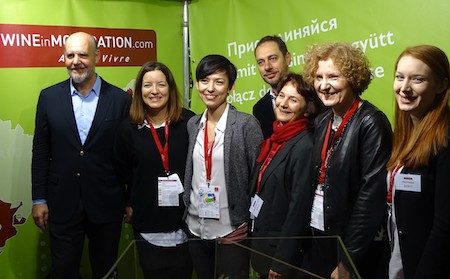The way you drink matters

In this edition of ESAE Voices, HQ asked Stylianos Filopoulos, director of Wine in Moderation, how a policy commitment to the European Commission helped him and his association to develop a global movement and nurture a culture of responsible drinking
 Isn’t it common sense that we should drink moderately?
Isn’t it common sense that we should drink moderately?
Wine has beauty but also risks. Moderation, as with everything in life, is key. For the majority, drinking in moderation and respecting wine and its culture is common sense, but this is not the case for everyone. There is indeed a minority that drink alcoholic beverages in ways that can harm themselves and those around them.
Why the focus on wine?
We are lucky and proud to work with wine, a product of the land that is all about balance. As such, we can indeed build on its long-standing heritage and through scientific evidence, self-regulation and education to connect, motivate and empower wine professionals, to work towards a sustainable wine culture that will always inspire healthy lifestyles and well-being.
Tell us about how European Commission’s policy commitment of the EU wine sector has helped you promote responsible drinking.
“Wine in Moderation” was launched in 2008 as a tangible commitment of the EU sector in European Commission’s Alcohol and Health Forum to help reduce alcohol-related harms. The introduction of the EU Alcohol and Health Policy was a challenge but also an amazing opportunity to bring together the European wine sector and show how the wine culture of moderation can help change harmful drinking patterns.
From the very beginning, it was clear that for the programme to be successful, it should refrain from the institutional framework and be endorsed by the international wine community. Something that speak to both wine professionals and consumers at the same time. As such, the international not-for-profit WiM Association was created in 2011 to support “Wine in Moderation” in terms of international coordination, accountability and growth. Together with the help of national coordinators that properly adapts the programme to the national needs, the message of drinking in moderation is able to reach millions of professionals and consumers every year.
Since Wine in Moderation was launched in 2008, how successful do you think you have promoted your causes?
From the very beginning, the Wine in Moderation programme has aimed to make a measurable contribution to how people approach wine, and reducing the abuse of alcohol drinks. The progress made has not only been recognised and referenced as good practice by national, European and international authorities, but most importantly, it has served as a model of sustainability and social responsibility in the wine business worldwide.
Reaching our 10th anniversary, we are extremely happy to see that what started as the vision of few leading personalities, is now a well-respected and credible programme synonymous with social responsibility and sustainability.
Sustainability is about change and creating value for society and being able to capture the value created. We will continue to listen to the needs of our stakeholders and pursue our efforts to support the sustainable development of both our business and the society.
How do you manage risks?
We always try our best to understand the rather big and dynamic ecosystem of our association and minimise risks. Every new member, every new country that joins the programme is a challenge and a risk. We can only mitigate risks if we can be true to our values and keep our integrity.
 What is your favourite wine?
What is your favourite wine?
My favourite wine depends on the moment. There are moments that you seek the company of something light and easy and at other times, you look for elegance and complexity. Some wines can reveal new characteristics when paired with specific foods or depending on their maturity.
How should wine be enjoyed?
To fully appreciate wine you should drink slowly, with good food and good company, and avoid drinking in excess of course. There are also situations that drinking should be avoided (pregnancy, driving, etc). Always consult your doctor about your drinking habits.
Any advice for other association leaders like yourself?
We are lucky enough to work in international associations and be exposed to different cultures and challenges, and drive change. It’s a unique experience but sometimes it can also be frustrating too. If you think that you are alone in this, don’t. As most associations have similar challenges, I find meeting and sharing ideas and knowledge with other association executives extremely helpful.
Join Stylianos at European Society of Association Executives (associationexecutives.eu) for networking opportunities, knowledge sharing and more.
Learn more about Stylianos’ association at www.wineinmoderation.eu
Other Articles
About Us
Supported by the Union of International Associations (UIA), the International Association of Professional Congress Organisers (IAPCO) and the Interel Group, the global public affairs and association management consultancy, Headquarters Magazines serve the needs of international associations organising worldwide congresses.














